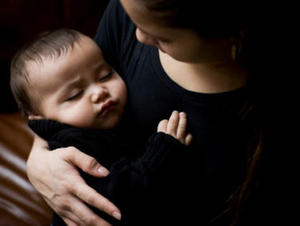ImmigrationRepeal of birthright citizenship would swell ranks of U.S. unauthorized population
Passage of the House-introduced Birthright Citizenship Act, which would deny U.S. citizenship to children born to parents who are both unauthorized immigrants, would increase the unauthorized population from its current 10.8 million to 16 million by 2050; if U.S. citizenship is denied to children who have one unauthorized immigrant parent, the total unauthorized population would rise to 24 million in 2050 under a scenario in which citizenship is denied to U.S.-born children who have one unauthorized immigrant parent, even if the other parent were a U.S. citizen; under a scenario of denying birthright citizenship to children who have at least one authorized immigrant parent, by the third generation, 6.3 million U.S.-born people would be unauthorized despite having two U.S-born parents

U.S. citizen at birth // Source: colorlines.com
Repeal of birthright citizenship for the U.S.-born children of unauthorized immigrants would expand the U.S. unauthorized population by at least five million over the next decade, according to a new report from the Migration Policy Institute.
The report’s principal author is Jennifer Van Hook, professor of sociology and demographics at Penn State and non-resident fellow at the Washington, D.C.-based institute. “While some are discussing an end to birthright citizenship as a means to reduce illegal immigration,” Van Hook said, “repeal of birthright citizenship would generate a large U.S.-born unauthorized population that has the potential to grow over time, even assuming an immediate and complete halt in new illegal immigration.”
The report, “The Demographic Impact of Repealing Birthright Citizenship,” employs standard demographic techniques and conservative demographic assumptions to assess how the Birthright Citizenship Act of 2009 or changes to the 14th Amendment would affect the size of the unauthorized population through 2050.
The analysis reveals that the passage of the House-introduced Birthright Citizenship Act, which would deny U.S. citizenship to children born to parents who are both unauthorized immigrants, would increase the unauthorized population from its current 10.8 million to 16 million by 2050, assuming a steady-state model.
Of the estimated 4.7 million unauthorized immigrants who had been born in the United States as of 2050, one million would have two U.S.-born parents. The share of all U.S. children in 2050 who would be unauthorized would double, from 2 percent currently to 4 percent, under the proposed law.
Alternative scenarios that would limit citizenship beyond the proposed Birthright Citizenship Act — for example, by denying U.S. citizenship to children who have one unauthorized immigrant parent — would generate even higher unauthorized population estimates. The total unauthorized population would rise to 24 million in 2050 under a scenario in which citizenship is denied to U.S.-born children who have one unauthorized immigrant parent, even if the other parent were a U.S. citizen.
“What is less commonly understood in the current debate is that repeal of birthright citizenship would set in motion the creation of a self-perpetuating class of unauthorized immigrants,” said the report’s co-author, Michael Fix, senior vice president and director of studies at the Migration Policy Institute.
Under a scenario of denying birthright citizenship to children who have at least one authorized immigrant parent, by the third generation, 6.3 million U.S.-born people would be unauthorized despite having two U.S-born parents. “This perpetuation of hereditary disadvantage based on the legal status of one’s ancestors would be unprecedented in U.S. immigration law,” Fix said.
The Migration Policy Institute is an independent, non-partisan think tank dedicated to analysis of the movement of people worldwide.
